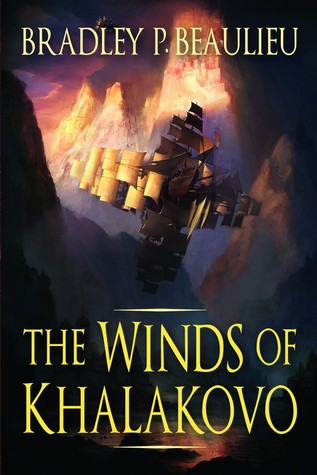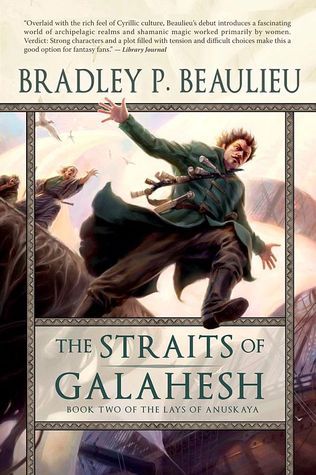My path to Bradley Beaulieu’s writings was probably different from most people’s: I discovered him only recently through Strata, the excellent science fiction novella he co-wrote and self-published with Stephen Gaskell (review). I enjoyed Strata so much that I immediately went back to check out his ambitious full length debut The Winds of Khalakovo. Now, about a year later, Night Shade Books delivers the second novel in the Lays of Anuskaya series: The Straits of Galahesh.
Short version: if you enjoyed The Winds of Khalakovo, I’m relatively sure you’ll like The Straits of Galahesh even more. The new novel brings to the table the same strengths and weaknesses as its predecessor, but all in all it’s a more polished work that promises great things for Bradley Beaulieu’s future.
The titles of both novels—not to mention the entire series—prominently feature place names, so it’s probably not surprising that the setting is a big part of what makes these books special. This is the story of a brand new and utterly fascinating fantasy universe: the Grand Duchy of Anuskaya, a realm comprised of a number of island groups that are linked together by flying windships, which sail the magical aether using a combination of sails and magic. The “Landed” rulers of Anuskaya have a distinctly Russian flavor, from the names of places and characters to their food, drink, clothing and so on. A second ethnic group, the (mostly) peaceful Aramahn, appears to be more of a parallel to Arabic or Persian people of our world. The Landed Anuskayans rely heavily on Aramahn magic to power their windships, which results in an uneasy coexistence because the Anuskayan islands were originally part of the Aramahn homeland.
In The Straits of Galahesh, a large part of the action shifts to a third area, the Empire of Yrstanla and specifically the island of Galahesh, which feel distinctly Turkish or Ottoman. The parallels to our world are clear, but I’m not sure if these novels are meant to reflect a specific era in the same way that e.g. Guy Gavriel Kay’s novels are often clear fantasy retellings of real historical periods.
In either case, the geographical and historical angles are only part of the puzzle. Bradley Beaulieu literally adds another dimension to the story with the spirit realm Adhiya, which is the home of “hezhan” or spirits that come in several varieties: vanahezhan are earth spirits, suurahezhan are fire spirits, and so on. Certain Aramahn can bond with these, allowing them to perform magic in the material world of Erahm. A second form of magic is controlled by the Matri or Anuskayan matriarchs, who submerge themselves in freezing underground “drowning basins” to touch the magical aether, allowing them to control animals and communicate telepathically. The contrast between the exhilaration of flying on a magic-controlled windship and the claustrophobic terror of being drowned in ice cold water is hard to miss and only heightens the impression that the Matri’s type of magic is one of the most uncomfortable ones ever seen in fantasy.
As the novels progress, it gradually becomes more and more clear that the political machinations of Anuskaya are only one aspect of a larger tale that started centuries ago and involves the very nature of the two realms and of reality itself. The Lays of Anuskaya shines most brightly when it interweaves these two elements—politics and, for want of a better word, magic—into one larger tale. It’s probably incorrect to say that one of these aspects is more important than the other, which is a testament to Bradley Beaulieu’s skill as a storyteller even so early in his career.
 Yes, but what about the characters, you ask? I haven’t focused on them much in this review to avoid spoilers, as The Straits of Galahesh is the sequel to a novel that didn’t get nearly as much attention as it should have. Suffice it to say that each of the books has a small ensemble cast of three main characters. The point of view changes every few chapters to approach the story from different perspectives, including a young noble from the house of Khalakovo, the princess he is supposed to marry, and several Aramahn. If ever the saying “all is fair in love and war” could apply to a fantasy series, it would be this one, because politics and emotion intertwine in these people’s lives right from the start and in various and often surprising ways.
Yes, but what about the characters, you ask? I haven’t focused on them much in this review to avoid spoilers, as The Straits of Galahesh is the sequel to a novel that didn’t get nearly as much attention as it should have. Suffice it to say that each of the books has a small ensemble cast of three main characters. The point of view changes every few chapters to approach the story from different perspectives, including a young noble from the house of Khalakovo, the princess he is supposed to marry, and several Aramahn. If ever the saying “all is fair in love and war” could apply to a fantasy series, it would be this one, because politics and emotion intertwine in these people’s lives right from the start and in various and often surprising ways.
In that sense, these novels reminded me at times of Robin Hobb’s Seven Duchies/Rain Wilds series. Both series start out by focusing on people who live on the intersection of the public and the personal, then gradually zoom out to show that even the larger perspective of the world’s current power struggles is only one piece of a puzzle that started long before any of the main characters were born. Personal relationships, political struggles, and age-old magics that affect the very nature of the world all play important roles in shaping these novels.
The ambition is definitely there. The scope is impressive. The creativity of the world-building is wonderful and, to my mind, the best part of these novels. Still, there are definitely also a few weaknesses. Depending on your personal taste, these books may be a challenging read.
Even though the setting of these novels is one of their strengths, the way it’s introduced to the reader is occasionally frustrating. The characters’ names fall into three linguistic groups: Russian, Arabic/Persian, and Turkish. Even though there are just a few key players in each group, there’s also a cast of side-characters, and because of the similarity of their names it can at times be hard to keep track of who’s who. Likewise, the novel is full of new vocabulary that’s mostly just used without explanation, creating a learning curve for the reader. This is one of those novels where you occasionally just have to keep reading even if you’re confused about a certain term or don’t fully understand the finer points of the setting, trusting that it’ll eventually become clear. (In that sense, it’s a shame that only the second novel in the series has a glossary and a section explaining the magic system and windships. This would have been very helpful in the first novel too.)
Another concern is pacing and structure. The novels switch perspective every few chapters, which results in a few annoying cliffhangers. More importantly, Bradley Beaulieu covers a huge amount of plot in each novel, and the narrative tension is often maintained at a high pitch. Especially the second half of The Winds of Khalakovo is so full of spectacular battles and hair-raising escapes that it becomes exhausting towards the end. By contrast, the early parts of The Straits of Galahesh sometimes feel as if the novel is wandering rather than going somewhere, with several scenes that maybe could have been trimmed down. (To be fair, it also contains a handful of scenes that are simply brilliant.) Because the three main characters are in different locations for most of the novel, it occasionally feels like three separate stories that were chopped up and combined into a novel, rather than one cohesive story. Fortunately Beaulieu pulls the threads together at the end, delivering a climactic and powerful finale.
If you’re the kind of reader who enjoys Steven Erikson’s approach of throwing readers into a setting without too much guidance and letting the story do the job of explaining the details as it progresses, you should have a great time getting to know this fantasy universe. While that happens, you’ll be treated to healthy doses of feudal and international politics, strong characters, unique magic, romance, spectacular battles on land and in the air, and a story that continues to broaden in scope. The Lays of Anuskaya is shaping up to be a fine fantasy trilogy.
Stefan Raets reads and reviews science fiction and fantasy whenever he isn’t distracted by less important things like eating and sleeping. His website is Far Beyond Reality.










